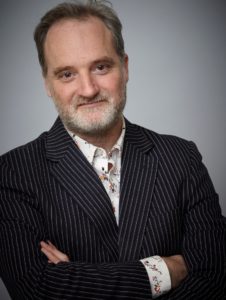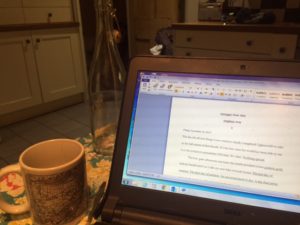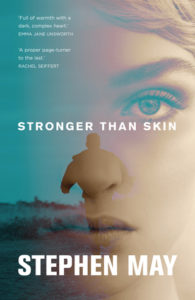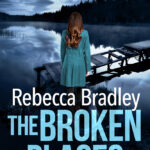Today we have a weekend treat, with a First Draft Q&A. I’m pleased to be able to welcome Stephen May to the blog to talk about his first draft process.
 Stephen May’s fourth novel Stronger Than Skin is published by Sandstone Press in March 2017.
Stephen May’s fourth novel Stronger Than Skin is published by Sandstone Press in March 2017.
His previous novels are Wake Up Happy Every Day (Bloomsbury 2014), Life! Death! Prizes! (Bloomsbury 2012) and TAG (Cinnamon Press, 2008)
Life! Death! Prizes! was shortlisted for the Costa Novel Award and the Guardian Not The Booker Prize. It was translated into German as Wir Kommen Schon Klar.
TAG was one of ten books longlisted for Welsh Book of the Year and went on to win the Media Wales Readers’ Prize.
His plays The Reverse Is Also True (2015 co-written with Mark Illis), Back The World (2003) and Still Waiting for Everything (2005) toured nationally to good reviews. He also had an unhappy stint working as a storyline writer on Emmerdale. He has also written textbooks on writing. He likes to collaborate on performance projects with other writers and with dancers, musicians and film-makers
Stephen May was brought up in Bedford and now lives in West Yorkshire.
When you decide to write something new, what is the first thing you do?
I talk about it to as many people as possible to see if the basic idea sparks a reaction or if there are objections that come up immediately. If several people are genuinely enthusiastic, then it’s probably a goer. Or might be. Tho good ideas are killed by better ideas, so I have always abandoned quite a few serviceable beginnings in a search for a world I’m prepared to spend a year or two travelling around, or characters interesting enough to sustain my interest
Do you have a set routine approaching it?
I like to have a detailed opening in my head before I start and a vague idea of how things might end up. I generally have almost no idea of how I’m going to get from starting to finishing line. I will usually plan (very roughly) a chapter before starting it. I write in the (very) early mornings and edit in the late afternoons. I actually hate writing first drafts. It’s like the words are being torn out of me. Or are being chipped out of me in some kind of terrible surgical operation where the anesthetic has failed. It’s like I’m actually performing the story onto the keyboard. It hurts. Often it feels like a kind of OCD and I only stick with it because I feel even worse if I don’t do it. I do like the feeling of having written however, the endorphins kick in for a little while.
Pen and paper or straight to the keyboard?
Like most people now I actually can’t handwrite. Even a note for the milkman gives me cramp in the wrist. Oddly where I DO write by hand (because I’m somewhere without power and my battery life is short) then I tend to make fewer revisions later. It’s as if the physical effort of handwriting means I choose words with more care.
How important is research to you?
Until recently I would have said I hate research. Would have said research is like being held up in a traffic jam when you’re in a tearing hurry. But I think I might try something historical next and I’ll need to do research properly. With Stronger Than Skin I did spend several afternoons in the British Library revisiting guidebooks to 1990 Cambridge and found it was good fun. I read widely (I get The Economist and the New Scientist – because they are areas where I feel I don’t know enough and I read historical writing for pleasure and can spend weeks meandering through Wikipedia so I pick things up jackdaw style). I did love reading Chat, Bella, Pick It Up etc for Life! Death! Prizes! (though that never felt like ‘research’. I love those real life magazines and am left with the habit of reading them to this day) But generally I rely on an alchemy of experience, imagination and observation to find the fuel for my stories.
How do you go about researching?
I’ve generally written contemporary set novels involving people whose lives are familiar to me. But I do pay attention to the little things that other people might miss. Most good writing is about looking very hard at things. But I like finding stories and unusual facts from magazines and newspapers. And, like I say, I’m a wanderer through the darker, less well trod paths of Wikipedia. And I love libraries too. I love the accidental collisions that happen in the stacks. Times when you look for one book and find it’s next to another, even more interesting, even more useful text.
How do you store everything; ideas, research, images that catch your eye?
I have a notebook on the go but I do also trust the process. If I’ve forgotten something then it wasn’t good enough to find a way into the book. I’m guided by my unconscious quite a lot. If you keep showing up for work, then your unconscious will lead you to the stuff that can help.
Tell us how that first draft takes shape?
Very painfully, very messily, with many false starts and blind alleys. I’m like a frantic blind man trying to out-run demons. There’s a fair degree of panic.
Are there any rituals you have to do or items you must have with you while writing that draft?
I rely on a near endless supply of caffeine and toast.
Does the outside world exist or are you lost to us for a period of time as the magic works?
I can succeed in shutting out the world for an hour or two if I get started quickly enough. If I check emails or Twitter etc, then I’m lost. The grubby, sticky fingers of the real world have claimed me and there’ll be little or no proper work done for the rest of the day.
 What does your workspace look like?
What does your workspace look like?
I did turn the spare bedroom into an office. But I never go there. Or hardly ever. If I can I like to write at the kitchen table (near the kettle and the bread). It’s a warm room and I live with (comparatively) late risers, so for an hour or two every morning it’s my own kingdom. But these days I can write anywhere. I wrote Stronger Than Skin on trains, in cafes, in libraries, in pubs and (whisper it) at the day job…
Edit as you go or just keep getting words out?
Don’t get it right get it written is a good rule, but I try and nip and tuck as I go, in the hope it’ll save me time at the end (it doesn’t). It’s good to beware the deadening effect of habit and routing. It’s probably a good idea to modify your practice at least a bit with each book.
I see many writers counting words in a day. Word counter or other method of keeping track of progression?
The trick is not to write a 1000 words a day or for a set number of hours a day but to try and think how many GOOD words you can write in the time available. It’s not like running or going to the gym. You have to keep showing up, you have to keep exercising the muscles yes, but you also have to know there will be days when the 1000 words (or 500, or 200 or 10) aren’t anywhere near good enough and they have to be sacrificed. Or maybe – over night – you dreamt up a new direction that necessitates the dumping of all previous work – even if it is good – however painful that it. I try to trick myself by saying all sacrificed work might become short stories later. And you have to know that the work that wasn’t good enough yesterday will push today’s work to be better. Fail. Fail again. Fail better. Samuel Beckett’s line is a holy writ for me.
So, that first draft is down. Roughly how long did it take? And what shape is it in?
A first draft has always taken me about a year. A second draft (which is often really a whole new first draft) between 6 months and a year. Stronger Than Skin had several ‘first drafts’ before I felt I had voice, story and structure properly balanced and so could begin to think of real second and third drafts. But each book is different.
In what format do you like to read it through, ereader, paper or the computer screen?
Sometimes I read on the screen. It’s always a mistake. It should be paper really. But before that I try and read it out loud from the screen and fix the obvious things that come out of that exercise (repetitions, inconsistencies in tense, particularly clunky sentences – they’re all revealed very quickly by reading aloud.)
What happens now that first draft is done?
You put it in a drawer and wait as long as you dare. When you do take it out and look at it again the changes you need to make will be obvious. Somehow, the weaknesses in your manuscript will have risen to the surface and can be dealt with… That’s the theory anyway.
Thanks for digging into the depths of the first draft. It’s been a pleasure having you.
Thanks for asking me! Good questions…
You can find Stephen on his Website | Sandstone Press | Wordery
Stronger Than Skin
 Mark Chadwick is cycling home from work, eager to get back to his pregnant wife Katy and two children, when he sees the police calling at his house. He knows exactly why they are there and he knows that the world he has carefully constructed over twenty very deliberately uneventful years is about to fall apart. He could lose everything. A story of a toxic love gone wrong, with a setting that moves easily between present day London and 1990s Cambridge, Stronger Than Skin is compulsively readable, combining a gripping narrative with a keen eye for the absurdities of the way we live now.
Mark Chadwick is cycling home from work, eager to get back to his pregnant wife Katy and two children, when he sees the police calling at his house. He knows exactly why they are there and he knows that the world he has carefully constructed over twenty very deliberately uneventful years is about to fall apart. He could lose everything. A story of a toxic love gone wrong, with a setting that moves easily between present day London and 1990s Cambridge, Stronger Than Skin is compulsively readable, combining a gripping narrative with a keen eye for the absurdities of the way we live now.



I’m reading this at the moment for a blog tour – Tuesday at mine – and I’m about two thirds of the way through. I actually assumed he was AT Cambridge in the 90s as it seems so real – not that I was there, I’m way too thick! He’s exceptionally good at noticing everyday quirks, and making amusing observations about them. I’m loving this book and I can see me working my way through his backlist. It’s one you literally don’t put down – you carry it to make tea, to the loo, pick it up every spare minute. I’d recommend it to everyone – it’s not a genre book, just a blinking great book.
I wasn’t there… but my Dad was. Kind of. In a way. He was a porter at Kings College in the 1990s and those guys have an interesting take on Uni life and definitely notice things that students, professors and tourists all miss… Spent quite a lot of time wandering the pubs and cafes of the town too…
I can’t imagine writing just anywhere. Admire those of you who can, Stephen!
Another fascinating look at the way different authors go about it! Thank you, both. And it’s nice to ‘meet’ someone else who likes to have a good, clear , start to a book. I like to do the same thing.
I can identify with ‘several first drafts’ 🙂